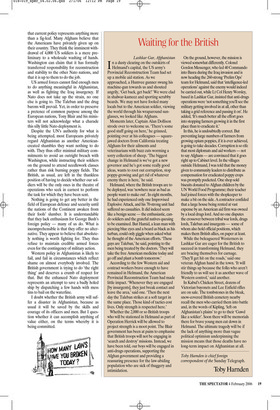Waiting for the British
Lashkar Gar, Afghanistan
In a dusty clearing on the outskirts of Helmand’s capital, the US army’s Provincial Reconstruction Team had set up a mobile aid station. As we approached, a Humvee gunner swung his machine-gun towards us and shouted angrily, ‘Get back, get back!’ We were clad in shalwar-kameez and sporting scrubby beards. We may not have fooled many locals but to the American soldier, viewing the world through his wraparound sunglasses, we looked like Afghans.
Moments later, Captain Alan Dollison strode over to welcome us. ‘There’s some good stuff going on here,’ he grinned, pointing over at his colleagues — squarejawed doctors from California treating Afghans for their ailments and veterinarians with buzz cuts worming a sorry collection of sheep. ‘The biggest change in Helmand is we’ve got a new governor and he’s got some really good ideas, wants to root out corruption, stop poppy-growing and get rid of whatever enemy there is here,’ he said.
Helmand, where the British troops are to be deployed, was ‘nowhere near as bad as people want to make out’. In eight months, he had experienced only one Improvised Explosive Attack, and his 70-strong unit had suffered no casualties. It did indeed seem like a benign scene — the enthusiastic, cando soldiers and the grateful natives queuing to be examined. But Hamid, a lean man with piercing blue eyes and a beard as black as his turban, could only giggle when asked what he thought of the American efforts. ‘These guys are Taleban,’ he said, pointing to the men being treated by the doctors. ‘They will take the free American medicine today and go off and plant a bomb tomorrow.’ According to the few Western aid and contract workers brave enough to have remained in Helmand, the American Provincial Reconstruction Team had made little impact. ‘Whenever they are engaged [by insurgents], they just break contact and leave the area,’ said one. ‘Then the next day the Taleban strikes at a soft target in the same place. Those kind of tactics cost lives. Only strength is respected here.’ Whether the 2,000 or so British troops who will be stationed in Helmand as part of Operation Herrick will be allowed to project strength is a moot point. The Blair government has been at pains to emphasise that British troops will not be engaging in ‘search and destroy’ missions. Instead, we have been told, our boys will be engaged in anti-drugs operations, supporting the Afghan government and providing a reassuring presence for the law-abiding population who are sick of thuggery and intimidation. On the ground, however, the mission is viewed somewhat differently. Colonel Gordon Messenger, who led 40 Commando into Basra during the Iraq invasion and is now heading the 260-strong ‘Prelim Ops’ team for Helmand, said that ‘intelligence-led operations’ against the enemy would indeed be carried out, while Lt Col Henry Worsley, based in Lashkar Gar, insisted that anti-drugs operations were ‘not something you’ll see the military getting involved in at all, other than taking a grid reference and passing it on’. He added, ‘It’s much better all the effort goes into stopping farmers growing it in the first place than to eradicate it.’ In this, he is undoubtedly correct. But preventing large numbers of farmers from growing opium poppies, if it is ever achieved, is going to take decades. Corruption is so rife that most diplomats and aid workers — not to say Afghans — are convinced that it goes right up to Cabinet level. In the villages outside Helmand, I was told that the money given to community leaders to distribute as compensation for eradicated poppy crops was promptly pocketed. One shop sold biscuits donated to Afghan children by the UN World Food Programme; their teacher had joined forces with the shopkeeper to make a bit on the side. A contractor confided that a large house being rented at vast expense by an American aid firm was owned by a local drugs lord. And no one disputes the crossover between tribal war lords, drugs lords, Taleban and insurgents — some of whom also hold official positions, which makes them British allies, on paper at least.
While the beleaguered Westerners in Lashkar Gar are eager for the British to succeed in transforming Helmand, they are bracing themselves for carnage. ‘They’ll get hit on the roads,’ said one veteran Afghan hand in the town. ‘It will stir things up because the folks who aren’t friendly to us will see it as another wave of Western control,’ said another.
In Kabul’s Chicken Street, dozens of Victorian bayonets and Lee Enfield rifles are on sale. The tombstones in the bleak, snow-covered British cemetery nearby recall the men who carried them into battle and, in the words of Kipling, ‘left on Afghanistan’s plains’ to go to their ‘Gawd like a soldier’. Soon there will be memorials there for brave young men cut down in Helmand. The ultimate tragedy will be if the lack of anything more than vague political optimism underpinning the mission means that those deaths have no long-term impact on Afghanistan at all.
Toby Harnden is chief foreign
correspondent of the Sunday Telegraph.
Toby Harnden





























































































































 Previous page
Previous page